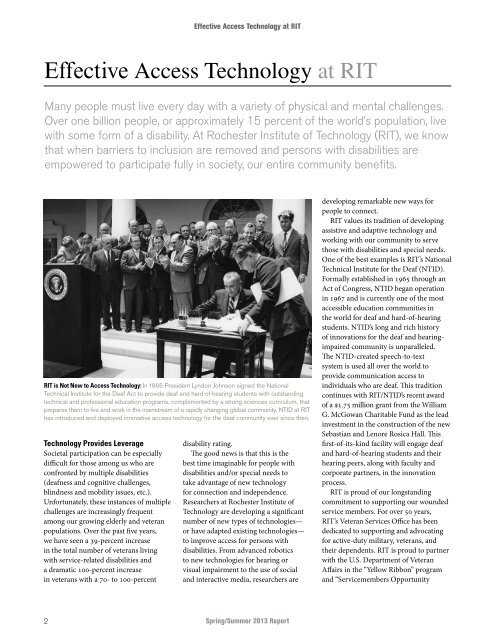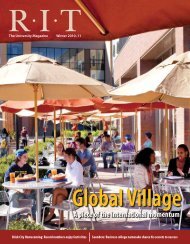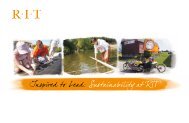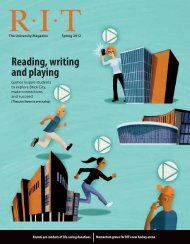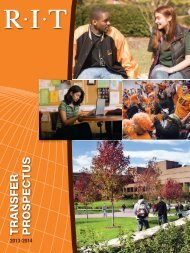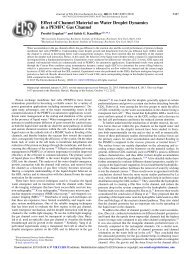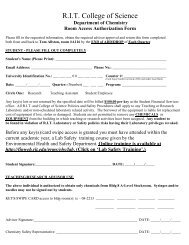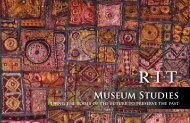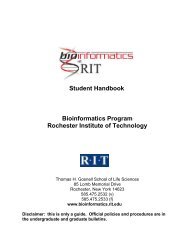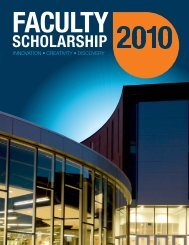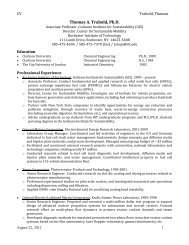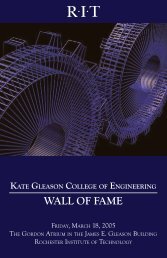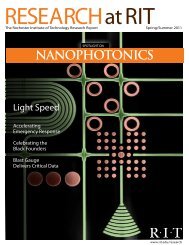Spring / Summer 2013 - Rochester Institute of Technology
Spring / Summer 2013 - Rochester Institute of Technology
Spring / Summer 2013 - Rochester Institute of Technology
Create successful ePaper yourself
Turn your PDF publications into a flip-book with our unique Google optimized e-Paper software.
Effective Access <strong>Technology</strong> at RIT<br />
Effective Access <strong>Technology</strong> at RIT<br />
Many people must live every day with a variety <strong>of</strong> physical and mental challenges.<br />
Over one billion people, or approximately 15 percent <strong>of</strong> the world’s population, live<br />
with some form <strong>of</strong> a disability. At <strong>Rochester</strong> <strong>Institute</strong> <strong>of</strong> <strong>Technology</strong> (RIT), we know<br />
that when barriers to inclusion are removed and persons with disabilities are<br />
empowered to participate fully in society, our entire community benefits.<br />
RIT is Not New to Access <strong>Technology</strong>: In 1965 President Lyndon Johnson signed the National<br />
Technical <strong>Institute</strong> for the Deaf Act to provide deaf and hard-<strong>of</strong>-hearing students with outstanding<br />
technical and pr<strong>of</strong>essional education programs, complemented by a strong sciences curriculum, that<br />
prepares them to live and work in the mainstream <strong>of</strong> a rapidly changing global community. NTID at RIT<br />
has introduced and deployed innovative access technology for the deaf community ever since then.<br />
<strong>Technology</strong> Provides Leverage<br />
Societal participation can be especially<br />
difficult for those among us who are<br />
confronted by multiple disabilities<br />
(deafness and cognitive challenges,<br />
blindness and mobility issues, etc.).<br />
Unfortunately, these instances <strong>of</strong> multiple<br />
challenges are increasingly frequent<br />
among our growing elderly and veteran<br />
populations. Over the past five years,<br />
we have seen a 39-percent increase<br />
in the total number <strong>of</strong> veterans living<br />
with service-related disabilities and<br />
a dramatic 100-percent increase<br />
in veterans with a 70- to 100-percent<br />
disability rating.<br />
The good news is that this is the<br />
best time imaginable for people with<br />
disabilities and/or special needs to<br />
take advantage <strong>of</strong> new technology<br />
for connection and independence.<br />
Researchers at <strong>Rochester</strong> <strong>Institute</strong> <strong>of</strong><br />
<strong>Technology</strong> are developing a significant<br />
number <strong>of</strong> new types <strong>of</strong> technologies—<br />
or have adapted existing technologies—<br />
to improve access for persons with<br />
disabilities. From advanced robotics<br />
to new technologies for hearing or<br />
visual impairment to the use <strong>of</strong> social<br />
and interactive media, researchers are<br />
developing remarkable new ways for<br />
people to connect.<br />
RIT values its tradition <strong>of</strong> developing<br />
assistive and adaptive technology and<br />
working with our community to serve<br />
those with disabilities and special needs.<br />
One <strong>of</strong> the best examples is RIT’s National<br />
Technical <strong>Institute</strong> for the Deaf (NTID).<br />
Formally established in 1965 through an<br />
Act <strong>of</strong> Congress, NTID began operation<br />
in 1967 and is currently one <strong>of</strong> the most<br />
accessible education communities in<br />
the world for deaf and hard-<strong>of</strong>-hearing<br />
students. NTID’s long and rich history<br />
<strong>of</strong> innovations for the deaf and hearingimpaired<br />
community is unparalleled.<br />
The NTID-created speech-to-text<br />
system is used all over the world to<br />
provide communication access to<br />
individuals who are deaf. This tradition<br />
continues with RIT/NTID’s recent award<br />
<strong>of</strong> a $1.75 million grant from the William<br />
G. McGowan Charitable Fund as the lead<br />
investment in the construction <strong>of</strong> the new<br />
Sebastian and Lenore Rosica Hall. This<br />
first-<strong>of</strong>-its-kind facility will engage deaf<br />
and hard-<strong>of</strong>-hearing students and their<br />
hearing peers, along with faculty and<br />
corporate partners, in the innovation<br />
process.<br />
RIT is proud <strong>of</strong> our longstanding<br />
commitment to supporting our wounded<br />
service members. For over 50 years,<br />
RIT’s Veteran Services Office has been<br />
dedicated to supporting and advocating<br />
for active-duty military, veterans, and<br />
their dependents. RIT is proud to partner<br />
with the U.S. Department <strong>of</strong> Veteran<br />
Affairs in the “Yellow Ribbon” program<br />
and “Servicemembers Opportunity<br />
2<br />
<strong>Spring</strong>/<strong>Summer</strong> <strong>2013</strong> Report


